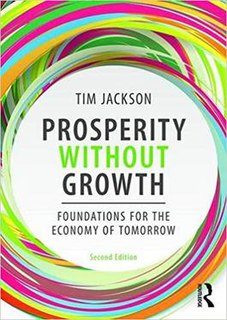
Sustainable development is an organizing principle for meeting human development goals while simultaneously sustaining the ability of natural systems to provide the natural resources and ecosystem services on which the economy and society depend on. The desired result is a state of society where living conditions and resources are used to continue to meet human needs without undermining the integrity and stability of the natural system. Sustainable development can be defined as development that meets the needs of the present without compromising the ability of future generations to meet their own needs.
The State of the World (SoW) was a series of books published annually from 1984 to 2017 by the U.S. based Worldwatch Institute, a thinktank that was founded in the 1970s by renowned environmentalist Lester R. Brown and ceased operations in 2017. The series attempted to identify the planet's most significant environmental challenges.
The Worldwatch Institute was a globally focused environmental research organization based in Washington, D.C., founded by Lester R. Brown. Worldwatch was named as one of the top ten sustainable development research organizations by Globescan Survey of Sustainability Experts.

Consumerism is a social and economic order that encourages the acquisition of goods and services in ever-increasing amounts. With the industrial revolution, but particularly in the 20th century, mass production led to overproduction—the supply of goods would grow beyond consumer demand, and so manufacturers turned to planned obsolescence and advertising to manipulate consumer spending. In 1899, a book on consumerism published by Thorstein Veblen, called The Theory of the Leisure Class, examined the widespread values and economic institutions emerging along with the widespread "leisure time" in the beginning of the 20th century. In it, Veblen "views the activities and spending habits of this leisure class in terms of conspicuous and vicarious consumption and waste. Both are related to the display of status and not to functionality or usefulness."
Overconsumption describes a situation where the use of a natural resource has exceeded the sustainable capacity of a system. A prolonged pattern of overconsumption leads to the eventual loss of resource bases. The term overconsumption is quite controversial in use and does not necessarily have a single unifying definition. Overconsumption is driven several factors of the current global economy, including forces like consumerism, planned obsolescence, and other unsustainable business models and can be contrasted with sustainable consumption.
Eco-capitalism, also known as environmental capitalism or (sometimes) green capitalism, is the view that capital exists in nature as "natural capital" on which all wealth depends. Therefore, governments should use market-based policy-instruments to resolve environmental problems.

Lester Russel Brown is a United States environmental analyst, founder of the Worldwatch Institute, and founder and former president of the Earth Policy Institute, a nonprofit research organization based in Washington, D.C. BBC Radio commentator Peter Day referred to him as "one of the great pioneer environmentalists."
The term "sustainable communities" has various definitions, but in essence refers to communities planned, built, or modified to promote sustainable living. Sustainable communities tend to focus on environmental and economic sustainability, urban infrastructure, social equity, and municipal government. The term is sometimes used synonymously with "green cities," "eco-communities," "livable cities" and "sustainable cities."
Tim Kasser is an American psychologist and book author known for his work on materialism and well-being.
Cultural economics is the branch of economics that studies the relation of culture to economic outcomes. Here, 'culture' is defined by shared beliefs and preferences of respective groups. Programmatic issues include whether and how much culture matters as to economic outcomes and what its relation is to institutions. As a growing field in behavioral economics, the role of culture in economic behavior is increasingly being demonstrated to cause significant differentials in decision-making and the management and valuation of assets.
Lifestyles of Health and Sustainability (LOHAS) is a demographic defining a particular market segment related to sustainable living, "green" ecological initiatives, and generally composed of a relatively upscale and well-educated population segment. The author Paul H. Ray, who coined the term Cultural Creatives in his book by the same name, explains that "What you're seeing is a demand for products of equal quality that are also virtuous." Included in the cultural creative demographic are consumers of New Age goods and services.
Degrowth is a term used for both a political, economic, and social movement as well as a set of theories that critiques the paradigm of economic growth. It is based on ideas from a diverse range of lines of thought such as political ecology, ecological economics, feminist political ecology, and environmental justice, pointing out the social and ecological harm caused by the pursuit of infinite growth and Western "development" imperatives. Degrowth emphasizes the need to reduce global consumption and production and advocates a socially just and ecologically sustainable society with social and environmental well-being replacing GDP as the indicator of prosperity. Hence, although GDP is likely to shrink in a "Degrowth society", i.e. a society in which the objectives of the Degrowth movement are achieved, this is not the primary objective of Degrowth.

Sustainability is the capacity to endure in a relatively ongoing way across various domains of life. In the 21st century, it refers generally to the capacity for Earth's biosphere and human civilization to co-exist. Sustainability has also been described as "meeting the needs of the present generation without compromising the ability of future generations to meet their needs". For many, sustainability is defined through the interconnected domains of environment, economy and society. Sustainable development, for example, is often discussed through the domains of culture, technology economics and politics.
Robert Engelman is an American author and former journalist who writes about the environment and population and serves as Senior Fellow at the Worldwatch Institute. He was President of the Institute from 2011 until 2014. His book More: Population, Nature, and What Women Want was published in 2008.

Disney English was a subsidiary of Disney Publishing Worldwide's Disney Learning division that specialized in English language training for young learners, ages 2 to 12, in China using Disney characters. Founded in 2008 in Shanghai, its classes used a curriculum put together by teaching professionals from China, Europe, and the United States. The program used the "Disney Immersive Storytelling Approach" which created an immersive environment incorporating Disney characters to make learning more fun for children. The brand is also used in Europe and Singapore as a name for Disney's English-language learning products.

The Free Culture Forum (FCForum) is an ian international meeting of relevant organisations and individuals involved in free culture, digital rights and access to knowledge. It has been taking place in Barcelona every year since 2009, jointly with the oXcars, a free culture festival.

Prosperity Without Growth is a book by author and economist Tim Jackson. It was originally released as a report by the Sustainable Development Commission. The study rapidly became the most downloaded report in the Commission's nine-year history when it was published in 2009. The report was later that year reworked and published as a book by Earthscan. A revised and expanded edition was published in January 2017.

Tim Jackson is a British ecological economist and professor of sustainable development at the University of Surrey. He is the director of the Centre for the Understanding of Sustainable Prosperity (CUSP), a multi-disciplinary, international research consortium which aims to understand the economic, social and political dimensions of sustainable prosperity. Tim Jackson is the author of Prosperity Without Growth and Material Concerns (1996). In 2016, he received the Hillary Laureate for exceptional mid-career Leadership. His most recent book Post Growth—Life After Capitalism was published in March 2021 by Polity Press.

Danielle J. Nierenberg is an American activist, author and journalist.
"The Path to Degrowth in Overdeveloped Countries" written by Erik Assadourian is the second chapter of the Worldwatch Institute's State of the World (2012), available for free online, along with these other chapters from the report: